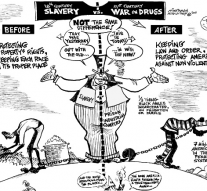
The War on Drugs is a War on the Black Community
Lifestyle & Opinion January 30, 2018By Kailey Huebl
Despite the impending threat of nuclear war and communism, Richard Nixon felt he had two enemies during his 1968 presidency: Anti-war leftists, better known as hippies, and the black community who often voted Democrats into office. Both parties were socially considered active participants in drugs, the hippies gravitating to marijuana while black folk tended to prefer heroin or crack. Nixon, instead of worrying about the international threats surrounding the United States in 1971, created the War on Drugs.
The War on Drugs began as strict regulations and more frequent arrests; however, it soon became much more. While the anti-war left did see an increasing number of fines and light sentencing for their marijuana use, the black community was ravaged with arrests and heavy sentencing. The War on Drugs was created to silence political enemies of Nixon. Unfortunately, the legacy still lingers today.
After the War on Drugs was declared, African-Americans became thirteen times more likely to be arrested for nonviolent drug crimes than their white counterparts. Along with higher arrest rates in the black community, heroin and crack addicts were punished more severely than any other addicts. At one point during Nixon’s term, there was a 100:1 ratio for crack and powder cocaine punishments. Five hundred grams of powder cocaine and five grams of crack carried the same sentence: a five year minimum mandatory sentence. The only difference? The most common user of powder cocaine was white.
The disparity between the punishments and arrest rates for black Americans versus white Americans became increasingly more evident as time passed. By 2001, the United States had incarcerated more African-American men than the number that had been slaves in 1820.
Today, there has been little change in reversing the unjust “War”. As of 2016, people of color made up 67% of the incarcerated community despite only making up 37% of the nation’s population. African Americans still are more likely to be arrested for drug crimes: six times that of their white counterpart. Overrepresentation in the incarcerated community is prevalent and thriving. This September, The Federal Bureau of Prisons reported 37.9% of inmates as African Americans. In 2017, one in ten black men were incarcerated at any given moment. Despite what many may think, the War on Drugs has never ended and America is still feelings the effects of the biased system. These statistics are not old; racially biased punishments prosper in America. While this issue seems unfixable, that idea is completely untrue.
The way to reverse the corruption of Nixon’s legacy is to call for nationwide decriminalization, rehabilitation, and for American citizens to be self-aware. With decriminalization, there is no way for drug incarceration racism to take place, as it would no longer be a criminal offense. Rehabilitation is crucial to reform, as it does away with severe drug use and helps people become healthy citizens. The state of California saves twice the amount of taxpayer money sending nonviolent drug offenders to rehab instead of prison. Finally, with self-aware citizens, it will become more evident that the current system of drug punishing is broken and in dire need of fixing. With the voices of the American people being heard, there is chance for a change in opinion as well as legislature. While it may seem too revolutionary, people have begun to take a stand.
Legalization of marijuana has become an immensely popular subject in recent news as more and more states are pushing for the overturning of current laws prohibiting the use of marijuana. As more and more states rule in favor of drugs, the national government will be forced to take action. Currently, marijuana is legal in eight states for recreational use, but it is thought that fifteen states will join in a few upcoming years and a record high of 64% of Americans believe marijuana should be legalized for recreational use. While marijuana is only one criminalized drug, the steps to reform are happening, and they will soon be revolutionary.
Nixon’s proclaimed “War on Drugs” has failed. Not only have one trillion American dollars poured into the corrupt system, drug use has seen a 126% increase and non-violent drug offenders now account for 25% of prisoners, up from 10% in the 1980s. It is time for the country to stop targeting the black community. Americans need to stand with their brothers and sisters and fight back against the racially biased system that is tearing families apart and ruining lives. It is time to take a stand: to declare war. It is time for the American people to declare a “War on Racism”.
Feature photo from:
Saporta, Carla. “SB 649: One Step Closer to a Fairer Criminal Justice System.” The Greenlining Institute, 17 Sept. 2013, greenlining.org/blog/2013/sb-649-one-step-closer-fairer-criminal-justice-system/.





